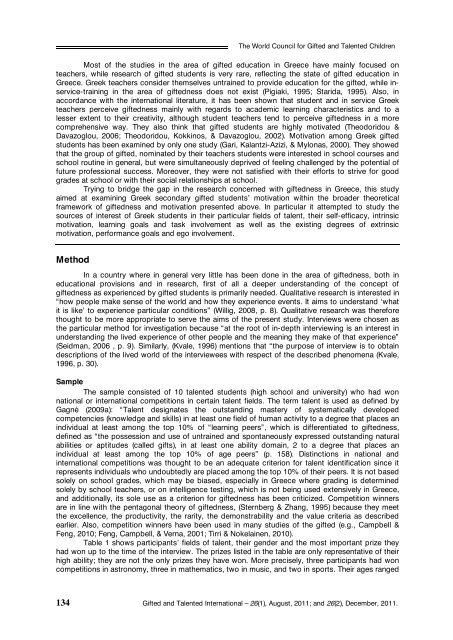The Journal of the World Council for Gifted and Talented Children
The Journal of the World Council for Gifted and Talented Children
The Journal of the World Council for Gifted and Talented Children
You also want an ePaper? Increase the reach of your titles
YUMPU automatically turns print PDFs into web optimized ePapers that Google loves.
<strong>The</strong> <strong>World</strong> <strong>Council</strong> <strong>for</strong> <strong>Gifted</strong> <strong>and</strong> <strong>Talented</strong> <strong>Children</strong><br />
Most <strong>of</strong> <strong>the</strong> studies in <strong>the</strong> area <strong>of</strong> gifted education in Greece have mainly focused on<br />
teachers, while research <strong>of</strong> gifted students is very rare, reflecting <strong>the</strong> state <strong>of</strong> gifted education in<br />
Greece. Greek teachers consider <strong>the</strong>mselves untrained to provide education <strong>for</strong> <strong>the</strong> gifted, while inservice-training<br />
in <strong>the</strong> area <strong>of</strong> giftedness does not exist (Pigiaki, 1995; Starida, 1995). Also, in<br />
accordance with <strong>the</strong> international literature, it has been shown that student <strong>and</strong> in service Greek<br />
teachers perceive giftedness mainly with regards to academic learning characteristics <strong>and</strong> to a<br />
lesser extent to <strong>the</strong>ir creativity, although student teachers tend to perceive giftedness in a more<br />
comprehensive way. <strong>The</strong>y also think that gifted students are highly motivated (<strong>The</strong>odoridou &<br />
Davazoglou, 2006; <strong>The</strong>odoridou, Kokkinos, & Davazoglou, 2002). Motivation among Greek gifted<br />
students has been examined by only one study (Gari, Kalantzi-Azizi, & Mylonas, 2000). <strong>The</strong>y showed<br />
that <strong>the</strong> group <strong>of</strong> gifted, nominated by <strong>the</strong>ir teachers students were interested in school courses <strong>and</strong><br />
school routine in general, but were simultaneously deprived <strong>of</strong> feeling challenged by <strong>the</strong> potential <strong>of</strong><br />
future pr<strong>of</strong>essional success. Moreover, <strong>the</strong>y were not satisfied with <strong>the</strong>ir ef<strong>for</strong>ts to strive <strong>for</strong> good<br />
grades at school or with <strong>the</strong>ir social relationships at school.<br />
Trying to bridge <strong>the</strong> gap in <strong>the</strong> research concerned with giftedness in Greece, this study<br />
aimed at examining Greek secondary gifted students’ motivation within <strong>the</strong> broader <strong>the</strong>oretical<br />
framework <strong>of</strong> giftedness <strong>and</strong> motivation presented above. In particular it attempted to study <strong>the</strong><br />
sources <strong>of</strong> interest <strong>of</strong> Greek students in <strong>the</strong>ir particular fields <strong>of</strong> talent, <strong>the</strong>ir self-efficacy, intrinsic<br />
motivation, learning goals <strong>and</strong> task involvement as well as <strong>the</strong> existing degrees <strong>of</strong> extrinsic<br />
motivation, per<strong>for</strong>mance goals <strong>and</strong> ego involvement.<br />
Method<br />
In a country where in general very little has been done in <strong>the</strong> area <strong>of</strong> giftedness, both in<br />
educational provisions <strong>and</strong> in research, first <strong>of</strong> all a deeper underst<strong>and</strong>ing <strong>of</strong> <strong>the</strong> concept <strong>of</strong><br />
giftedness as experienced by gifted students is primarily needed. Qualitative research is interested in<br />
“how people make sense <strong>of</strong> <strong>the</strong> world <strong>and</strong> how <strong>the</strong>y experience events. It aims to underst<strong>and</strong> ‘what<br />
it is like’ to experience particular conditions” (Willig, 2008, p. 8). Qualitative research was <strong>the</strong>re<strong>for</strong>e<br />
thought to be more appropriate to serve <strong>the</strong> aims <strong>of</strong> <strong>the</strong> present study. Interviews were chosen as<br />
<strong>the</strong> particular method <strong>for</strong> investigation because “at <strong>the</strong> root <strong>of</strong> in-depth interviewing is an interest in<br />
underst<strong>and</strong>ing <strong>the</strong> lived experience <strong>of</strong> o<strong>the</strong>r people <strong>and</strong> <strong>the</strong> meaning <strong>the</strong>y make <strong>of</strong> that experience”<br />
(Seidman, 2006 , p. 9). Similarly, (Kvale, 1996) mentions that “<strong>the</strong> purpose <strong>of</strong> interview is to obtain<br />
descriptions <strong>of</strong> <strong>the</strong> lived world <strong>of</strong> <strong>the</strong> interviewees with respect <strong>of</strong> <strong>the</strong> described phenomena (Kvale,<br />
1996, p. 30).<br />
Sample<br />
<strong>The</strong> sample consisted <strong>of</strong> 10 talented students (high school <strong>and</strong> university) who had won<br />
national or international competitions in certain talent fields. <strong>The</strong> term talent is used as defined by<br />
Gagné (2009a): “Talent designates <strong>the</strong> outst<strong>and</strong>ing mastery <strong>of</strong> systematically developed<br />
competencies (knowledge <strong>and</strong> skills) in at least one field <strong>of</strong> human activity to a degree that places an<br />
individual at least among <strong>the</strong> top 10% <strong>of</strong> “learning peers”, which is differentiated to giftedness,<br />
defined as “<strong>the</strong> possession <strong>and</strong> use <strong>of</strong> untrained <strong>and</strong> spontaneously expressed outst<strong>and</strong>ing natural<br />
abilities or aptitudes (called gifts), in at least one ability domain, 2 to a degree that places an<br />
individual at least among <strong>the</strong> top 10% <strong>of</strong> age peers” (p. 158). Distinctions in national <strong>and</strong><br />
international competitions was thought to be an adequate criterion <strong>for</strong> talent identification since it<br />
represents individuals who undoubtedly are placed among <strong>the</strong> top 10% <strong>of</strong> <strong>the</strong>ir peers. It is not based<br />
solely on school grades, which may be biased, especially in Greece where grading is determined<br />
solely by school teachers, or on intelligence testing, which is not being used extensively in Greece,<br />
<strong>and</strong> additionally, its sole use as a criterion <strong>for</strong> giftedness has been criticized. Competition winners<br />
are in line with <strong>the</strong> pentagonal <strong>the</strong>ory <strong>of</strong> giftedness, (Sternberg & Zhang, 1995) because <strong>the</strong>y meet<br />
<strong>the</strong> excellence, <strong>the</strong> productivity, <strong>the</strong> rarity, <strong>the</strong> demonstrability <strong>and</strong> <strong>the</strong> value criteria as described<br />
earlier. Also, competition winners have been used in many studies <strong>of</strong> <strong>the</strong> gifted (e.g., Campbell &<br />
Feng, 2010; Feng, Campbell, & Verna, 2001; Tirri & Nokelainen, 2010).<br />
Table 1 shows participants’ fields <strong>of</strong> talent, <strong>the</strong>ir gender <strong>and</strong> <strong>the</strong> most important prize <strong>the</strong>y<br />
had won up to <strong>the</strong> time <strong>of</strong> <strong>the</strong> interview. <strong>The</strong> prizes listed in <strong>the</strong> table are only representative <strong>of</strong> <strong>the</strong>ir<br />
high ability; <strong>the</strong>y are not <strong>the</strong> only prizes <strong>the</strong>y have won. More precisely, three participants had won<br />
competitions in astronomy, three in ma<strong>the</strong>matics, two in music, <strong>and</strong> two in sports. <strong>The</strong>ir ages ranged<br />
134 <strong>Gifted</strong> <strong>and</strong> <strong>Talented</strong> International – 26(1), August, 2011; <strong>and</strong> 26(2), December, 2011.


